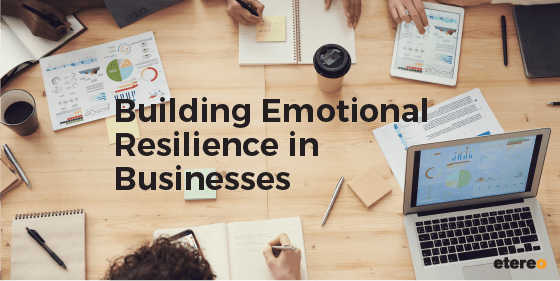Building Emotional Resilience in Businesses

If you have been observing for the past few decades, you would have witnessed the rise of many new industry players and at the same time, the fall of many. One should realise that the one thing common in these fallen industries is their reluctance to adapt and embrace changes! And this does not just apply to small companies, but established organisations as well.
When companies are faced with opportunities or threats, most fail to take a pro-active approach, but rather a reactive response towards them. In the face of threats, these companies find hard to compete against new competitors that have been innovating and value-add their products and services to fit current consumers’ behavioural trends. And in times of good growth and opportunities, these companies tend to be in their comfort zone believing that good days are here to stay. And it is only during a crisis that they realised that change is needed and they need to act fast to play catch up.

Unfortunately, during tough times, humans have a tendency to be easily influenced by unsought negativities. Even in an organisation filled with capable leaders and talents, negative sentiments can create self-doubt and fear, forcing them to withdraw into their comfort zone. And this may inadvertently put an organisation’s progress to a halt. From studies, emotional roadblock is seen as one of the biggest obstacles faced by many whenever they have to make hard decisions or implement drastic measures within the organisation.
You may also be wondering why some management remain unconcerned when ongoing disruptions are taking place at all times. Often times, these companies mostly owe their success stories to some of their old winning strategies. Falling back to the “tried-and-tested”, there is little or no incentive for them to adopt and embrace changes. Resources are committed into refining and improving this winning formula year after year. But what is often required might not be just improvement to existing strategies. Keeping abreast with consumers’ behavioural trends, an updated marketing strategy or even a change in the business model might be necessary to meet today challenges.
We have spoken to many SMEs leaders and here are some winning advice;
- Stop falling back to “tried-and-tested” formulas, what work in the past may not work now
- Keep an open line of communication with your staff, understand the problems they face, and you may realise that they are able to give a better assessment of the ground situations at times
- Lead by example in taking the first step to embrace new technologies and changes, you will be surprised to see employees taking their own initiatives
- Take small steps to build your company internal capabilities, this will reduce initial capital outlay and you can evaluate results as you progress
- Remove the ‘fear’ factor by keeping an open mind – learning from business associates and engaging with the relevant subject-matter experts, this can be from your employees within the organisation or from external consultants
- Dive in and evaluate your work processes from time to time to ensure resources are maximised and efficiency is improved
The difference between a growing business and a declining one is obvious from what we have seen; evaluate, a dare to try attitude, implement changes and take actions. And the failure to do so can be attributed to factors such as managerial stubbornness, incompetence and procrastination. To avoid such pitfalls, the management has to adopt the spirit of continuous learning and upgrading, constantly relooking into work processes and to maintain a high level of open-mindedness that is receptive to new ideas, and be able to set realistic targets for the business and team members to achieve.
If internal capabilities are limited, the management should be receptive to engage external help from consultants or external trainings to address the shortfalls. Change is inevitably stressful, painful or even to the point of helplessness if the organisation has a lack of competencies in areas to be addressed. The leadership must understand its own limitations (flaws & weakness), embrace a great sense of self-awareness, and not living in a world of self-belief, where the only reason to be utterly devoid of self-doubt and insecurities is delusion.

Embracing change encourages personal and organisational developments, even in times of adversity. Given the current COVID-19 situation, businesses across industries are deeply affected. Most are inadequately prepared when faced with this unprecedented crisis. With the government launch of relief packages from working capital loans, grants to reliefs for businesses, it is also paramount for business owners to evaluate, have a dare to try attitude, embrace changes and to take actions to achieve business continuity, resilience and sustainability beyond this crisis.
Prepare yourself for the next economic upturn by reaching out to us on how we can help SMEs to identify their business gaps. You can also embark on transformation projects under the EDG programme through certified consultants like us, with grants up to 90% by Enterprise Singapore.